IPBES publishes two reports to transform the way we engage with nature, conserve it and survive
CREAF attended the 11th General Assembly of the Intergovernmental Platform on Biodiversity and Ecosystem Services (IPBES), held recently in Windhoek, Namibia. This meeting marked a milestone with the approval of the NEXUS Report and the Transformative Change Report, which examine, on the one hand, the interrelationships between biodiversity, water, food, health and climate change, with more than 70 response options to maximise co-benefits, and on the other hand, proposes a roadmap with actions to transform how we live and rethink the role of nature at the heart of our survival.
CREAF and the Observatory of Natural Heritage and Biodiversity of Catalonia summarise the two reports.
NEXUS: 70 proposals for conserving nature and producing economic, social and health benefits at the same time
NEXUS: 70 proposals for conserving nature and producing economic, social and health benefits at the same time
The NEXUS report starts from a clear premise: environmental, social and economic crises are deeply connected. Addressing them in isolation is ineffective and has counterproductive consequences. The document, produced by 165 international experts, includes strategies that conserve nature while delivering many other benefits, such as restoring carbon-rich ecosystems, nature-based solutions and promoting healthy and sustainable diets.
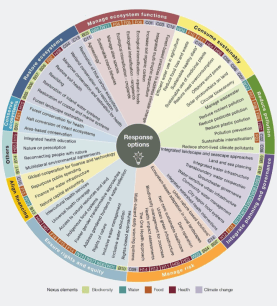
There are already many response options that various actors can implement. Source: NEXUS Report
Alicia Pérez-Porro, CREAF head of Political Engagement and Institutional Relations, and representative at the IPBES Assembly, highlighted the relevance of this report in decision-making:
‘The NEXUS Report is a call for urgent and coordinated action. We can no longer treat problems as silos; we need approaches that integrate biodiversity, water, food, health and climate change. In this framework, science has a key role to play in transforming evidence into workable solutions for public policy’.
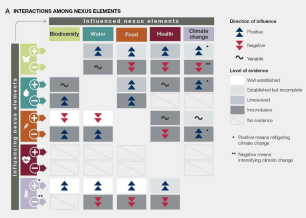
Evidence on the directionality of interactions between the elements of the nexus. Source: NEXUS Report
Beyond isolated approaches
Beyond isolated approaches
The report underlines that, if we do not change our current course, the unconsidered costs of our economic activities could amount to between 10 and 25 trillion dollars a year. These costs not only affect biodiversity, but also aggravate food insecurity and the climate crisis, with unequal impacts falling especially on the most vulnerable communities.
‘CREAF supports the implementation of integrated solutions that combine conservation, restoration and sustainability,’ adds Pérez-Porro. ‘It is a critical moment to align efforts on a global scale'.
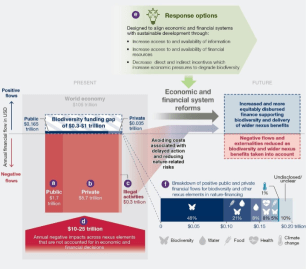
Biodiversity and financing linkages in the context of the wider economy. Source: NEXUS Report
TRANSFORMATIVE CHANGE: how to transform the economic system by taking nature into account
TRANSFORMATIVE CHANGE: how to transform the economic system by taking nature into account
The Transformative Change report, produced by over 100 experts from 42 countries, identifies fundamental transformations in current value systems, structures and practices as key to halting and reversing biodiversity loss. These transformations include:
- The adoption of sustainable economic strategies that could generate up to $10 trillion in business opportunities and 395 million jobs by 2030.
- Mainstreaming biodiversity into key sectors such as agriculture, fisheries, livestock and urbanisation.
- Reforms in governance systems and the inclusion of indigenous and local knowledge perspectives.
The report emphasises that current approaches, based on a system that bundles wealth in a few, that is disconnected from nature and only dominated by nature, and that is focused on short-term individual and material benefits is leading to the destruction of nature. It warns of the risks of not acting in time, including the possibility of crossing points of no return in key ecosystems such as coral reefs, the Amazon and the ice sheets of Greenland and West Antarctica.
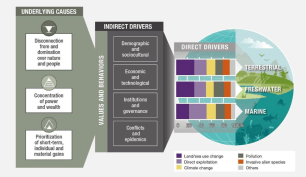
Underlying causes, indirect drivers and direct drivers of biodiversity loss and nature decline. Source: IPBES Report
The report also points to people's disconnection from nature, economic inequalities and a focus on short-term profits as the main causes of the problem. To address these, it proposes five complementary strategies:
- Conserve and restore sites of biocultural value.
- Transform economic sectors that negatively impact biodiversity.
- Promote economic systems that recognise the value of nature.
- Improve governance systems to make them more inclusive and adaptive.
- Change human perceptions and values to recognise the interconnectedness between people and nature.
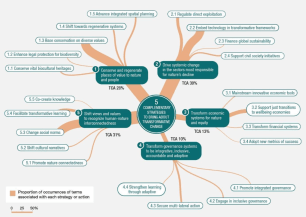
Dendrogram showing the proportion of occurrences of terms associated with strategies or actions. Source: IPBES Report
Alicia Pérez-Porro also highlighted the practical usefulness of this report:
‘This report is also relevant to identify what barriers we have that prevent transformative changes and a just transition. It is like a roadmap to combat the causes of biodiversity loss and to propose useful tools for all sectors and for society,’ concludes Pérez-Porro.
The report concludes that transformational change is a complex but achievable challenge. It requires the involvement of governments, citizens, private sectors and civil organisations to build an inclusive and collaborative vision of a world in balance with nature.
CREAF's commitment
CREAF's commitment
CREAF's presence at the IPBES General Assembly reaffirms its commitment to contribute to the design of transformative science-based policies. The work carried out in international platforms such as IPBES strengthens our mission to conserve biodiversity and guarantee a habitable planet for people and other living beings.







